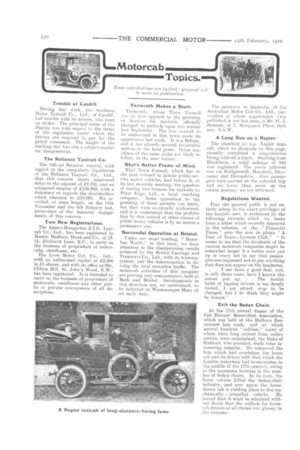Motorcab Topics.
Page 14

If you've noticed an error in this article please click here to report it so we can fix it.
News contributions are incited : payment nil/ be made on publication.
Trouble at Cardiff.
During last week, the smithe.rn Motor Taxicab Co., Ltd., cif Cardiff, had trouble with its drivers, who went on strike. The principal cause of the dispute Ivas with regard to the terms of the regulation under which the drivers are required to pay for the petrol consumed. The length of the working day was also a subject-matter for disagreement.
The Reliance Taxicab Co.
The Official Receiver reports, with regard to the compulsory liquidation of the Reliance Taxicab Co., Ltd., that this concern shows unsecured debts to the amount of £8,261, and an estimated surplus of £103,863, with a deficiency as regards the shareholders which amounts to J.:19,084. We recorded, at some length, on the I lth November and the 6th January last, particulars of the financial engagements of this concern.
Two New Registrations.
The Austra-Hungarian Z.I.G. Taxicab Co., Ltd., has been registered by Messrs. Redfern, Hunt and Co., of 1314, Abchurch Lane, E.C., to carry on the business of proprietors of motorcabs, omnibuses, etc.
The Lyon Motor Cab Co.. Ltd., with an authorized capital of 22,000 in shares, and with its office at 96a, Clifton Hill, St. John's Wood, N.W., has been registered. It is intended to carry on the business of proprietors of motorcabs, omnibuses and other public or private conveyances of all descriptions.
Yarmouth Makes a Start.
Yarmouth, whose Town Council v.ao: at Iirst opliosed to the granting of livences for taxicabs, officially changed its attitude upon this matter last September. The first taxicab to be authorized in this town made its appearance last week. it is a Belsize, and it has already. secured favourable notices in the local press. Other machines of the same make are likely to ftillow, in the near future.
Rhyl's Better Frame of Mind.
Rhyl Town Council, which has in the past refused to license public-service motor vehicles, had before it, at its last monthly meeting, the question of issuing two licences for taxicabs to Peter Edge, Ltd., a local coaching company. Some opposition to the granting of those permits was made, but they were eventually authorized, and it is understood that the prohibition by this eouncil of other classes of public motor vehicles is by no means a permanent one.
Successful Operation at Bristol.
Under our usual heading, " Motorbus World," in this issue, we draw attention to the disappointing results achieved by the Bristol Carriage and Tramways Co., Ltd., with its tramway system, and the determination to develop the local motorbus traffic. The motorcab activities of this company are proving very remunerative, both at Bath and Bristol. Developments in this direction are, we understand, to be initiated at Weston-super-Mare at an early date. The secretary in Australia, of the Australian Motor Cab Co., Ltd., pa rThai la is of a-hose registration acre published in our last issue, is Mr. II. J. Bennett. of 7, Macquarie Place, Syd ney. .s. W.
A Long Run on a Napier.
'The standard 13 lip. Napier taxicab, which we illustrate on this page, recently completed a long-distance hiring without a hitch. Starting from Blackburn, a total mileage of 840 was registered. The route followed was via Bridgenortb, Hereford, Gloucester and Devonshire. Five passengers were carried on the outward trip and no fewer than seven on the return journey. we are informed.
Regulations Wanted.
That the general public is not entirely asleep to the exact privileges of the taxicab user, is evidenced by the following extracts which we make from a letter which recently appeared in the columns of the '• Financial Times." over the nom de plume "A User of Taxis—Lyceum Club." " It seems to me that the dividends of the various motorcab companies might be somewhat larger if a notice were put up in every cab to say that passengers are requested not to pay anything that does not appear on the taximeter.
. . I use taxis a good deal, and, in only three cases, have I known the extras put up. . . The foolish habit of tipping drivers is too deeply rooted, I am afraid, ever to be changed, but 1 do think they might he honest."
Exit the Sedan Chair.
At the 17th annual dinner of the Cab Drivers' Benevolent Association, which was held at the Holborn Restaurant last week, and at which several hundred " cabbies," many of whom have long retired from active service, were entertained, the Duke of Rutland, who presided, made some interesting remarks. He compared the fate which had overtaken the horse cab and its driver with that which the London watermen had to encounter in the middle of the 17th century, owing to the enormous increase in the number of Sedan chairs. In its turn, the horse vehicle killed the Sedan-chair industry, and now again the horsedrawn cab is yielding place to the me
chanically propelled vehicle. He feared that it must be admitted without doubt that the outlook for horsecab drivers of all classes was gloomy in the extreme.








































